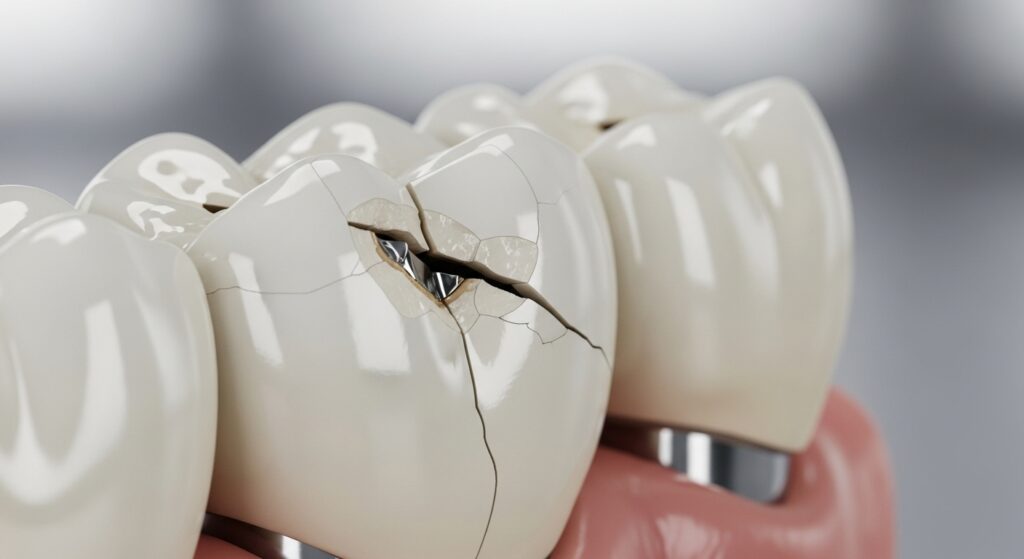In today’s fast-paced world, dental health often takes a backseat, yet even minor issues can have significant consequences if left unaddressed. One common dental problem is a chipped tooth crown. While it may seem minor at first, a damaged crown can affect oral function, aesthetics, and overall dental health.
This article explores the causes of chipped tooth crowns, their impact on daily life, effective treatments, and why proactive dental care is essential to prevent complications.
What is a Chipped Tooth Crown?
A dental crown is a protective covering placed over a damaged or weakened tooth to restore its shape, strength, and appearance. Crowns are made from materials like porcelain, ceramic, metal, or composite resin, and they are designed to withstand normal chewing and biting forces.
A chipped tooth crown occurs when part of the crown breaks, cracks, or wears down. This can result from trauma, grinding, poor fit, or material fatigue. While a small chip may seem purely cosmetic, it can expose the underlying tooth to bacteria, increasing the risk of decay, sensitivity, and further damage.
Common Causes of Chipped Tooth Crowns
Understanding the reasons behind a chipped tooth crown helps in both prevention and timely treatment:
-
Physical Trauma
Accidental falls, sports injuries, or biting down on hard objects can crack or chip a crown. -
Teeth Grinding (Bruxism)
Constant grinding or clenching puts excessive pressure on crowns, weakening the material over time. -
Poor Crown Fit
Ill-fitting crowns can bear uneven force, making them more prone to chipping. -
Material Wear
Over time, crowns made from less durable materials may chip due to wear and tear. -
Dental Decay Underneath the Crown
Even with a crown, if the underlying tooth develops decay, the structural integrity of the crown can be compromised.
Signs and Symptoms
Recognizing a chipped tooth crown early is crucial to avoid complications. Common signs include:
-
Noticeable cracks or missing parts of the crown
-
Sensitivity to hot, cold, or pressure
-
Pain while chewing
-
Rough or sharp edges inside the mouth
-
Discoloration or exposed underlying tooth structure
Prompt evaluation by a dental professional ensures the crown is repaired before further damage occurs.
Treatment Options for a Chipped Tooth Crown
Depending on the severity of the chip, several solutions are available:
-
Minor Chips
Small chips can sometimes be smoothed and polished by a dentist without replacing the crown. This quick intervention prevents sharp edges and restores comfort. -
Dental Bonding
For slightly larger chips, dental bonding using tooth-colored resin can fill gaps and restore the crown’s appearance. -
Crown Replacement
Significant damage usually requires replacing the crown entirely. Modern materials like porcelain-fused-to-metal or zirconia provide both durability and aesthetics. -
Underlying Tooth Care
If the tooth beneath the crown is damaged or decayed, additional procedures such as a root canal or tooth restoration may be necessary before placing a new crown.
The Importance of Timely Intervention
Addressing a chipped tooth crown promptly is not just about aesthetics. Delaying treatment can lead to:
-
Tooth decay under the damaged crown
-
Infection or abscess formation
-
Difficulty chewing or speaking
-
Accelerated wear of surrounding teeth
Early intervention preserves oral health, prevents costly treatments later, and ensures long-term functionality.
Preventive Measures
Preventing a chipped tooth crown involves both dental care and lifestyle adjustments:
-
Wear Protective Gear: Mouthguards during sports reduce the risk of trauma.
-
Avoid Hard Foods: Biting ice, hard candies, or non-food objects can stress crowns.
-
Manage Bruxism: Nightguards or stress-reduction techniques help prevent grinding-related damage.
-
Regular Dental Check-ups: Dentists can detect minor issues before they become major problems.
-
Maintain Oral Hygiene: Brushing, flossing, and using fluoride help protect both natural teeth and crowns.
By integrating these measures, patients significantly reduce the likelihood of experiencing a chipped crown.
Influence in Daily Life
A chipped tooth crown impacts more than just oral health—it affects confidence, comfort, and quality of life. Individuals may feel self-conscious about their smile, avoid certain foods, or experience discomfort while speaking or eating. Timely treatment restores function and boosts self-esteem, showing how dental care intersects with personal well-being.
Challenges and Considerations
While repairing or replacing a crown is straightforward, patients may face challenges such as:
-
Insurance coverage limitations for cosmetic repairs
-
Waiting periods for custom crowns from dental labs
-
Sensitivity or discomfort after procedures
-
Managing anxiety associated with dental visits
Working with a trusted dentist and understanding the options ensures the process is smooth and effective.
A Model for Long-Term Dental Care
The journey from a chipped crown to a restored, healthy smile reflects broader principles of preventive and patient-centered care:
-
Proactive Management: Addressing minor issues early avoids major complications.
-
Holistic Approach: Treating the crown along with the underlying tooth ensures lasting results.
-
Education and Awareness: Patients who understand risks and prevention can make better oral health choices.
This approach aligns with modern expectations for comprehensive dental care—combining functionality, aesthetics, and long-term health.
Looking Ahead
As dental materials and techniques continue to advance, addressing a chipped tooth crown has become faster, safer, and more effective. Innovations in ceramics, bonding resins, and CAD/CAM technology allow for durable, precise restorations that mimic natural teeth.
Ultimately, maintaining crowns and overall oral health requires vigilance, preventive care, and timely intervention. A chipped crown may seem minor, but with prompt action, patients can restore both appearance and function while avoiding complications.
In a world where dental aesthetics, function, and health are increasingly interconnected, understanding and caring for a chipped tooth crown ensures lasting smiles and confident living.







